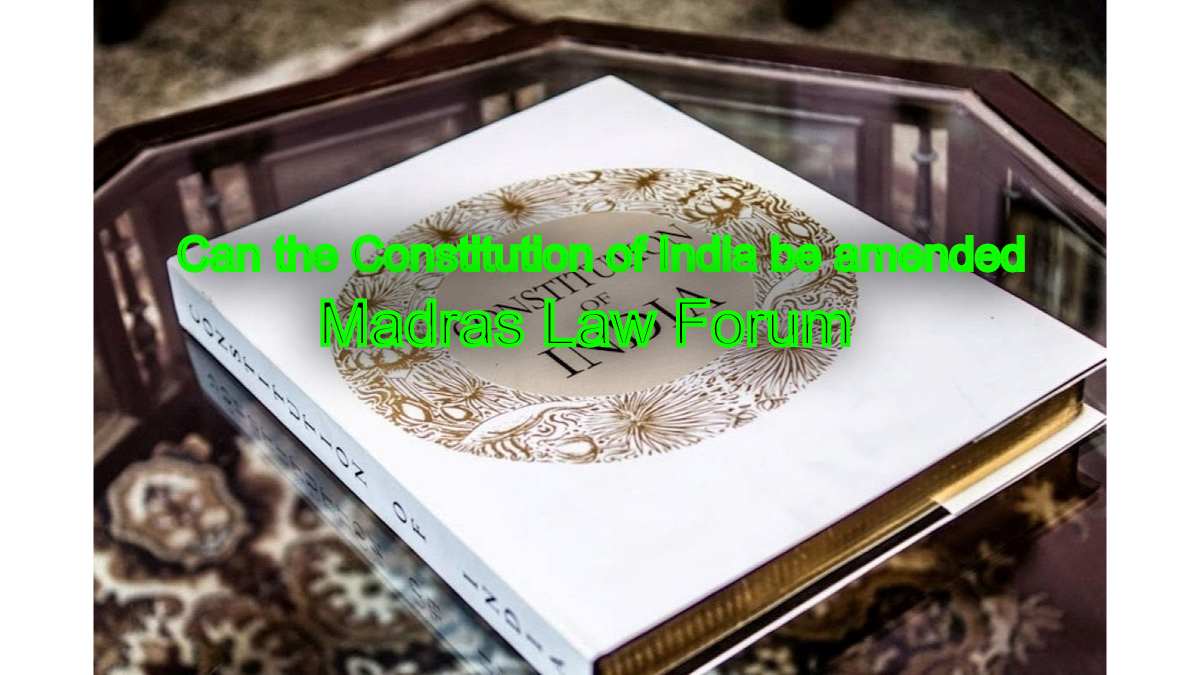The Constitution of India, a foundational document enshrining the rights and liberties of its citizens, has undergone several amendments over the years. While these amendments have been instrumental in adapting the Constitution to the evolving needs of the nation, there has always been a debate regarding the extent to which the government can modify the fundamental rights guaranteed to its citizens. This article explores the issue of whether the Constitution of India can be amended to infringe upon fundamental rights, drawing insights from the Madras Law Forum.
Can the Constitution of India be Amended to Infringe Upon Fundamental Rights: Madras Law Forum
Fundamental Rights and the Constitution
Fundamental rights, enshrined in Part III of the Constitution, are the cornerstone of Indian democracy. The state cannot infringe upon these inviolable rights. They include the right to equality, liberty, life and personal liberty, freedom of religion, cultural and educational rights, and property rights. The framers of the Constitution recognized the importance of these rights in ensuring a just and equitable society and therefore made them fundamental to the Indian polity.
The Doctrine of Basic Structure
The Supreme Court of India, in its landmark judgment in Kesavananda Bharati v. State of Kerala (1973), introduced the doctrine of basic structure. The Supreme Court declares that specific aspects of the Constitution are essential to its nature and cannot be modified through amendments. While the court did not provide a definitive list of basic features, it suggested that they include the republican form of government, federalism, secularism, and the supremacy of the Constitution.
The doctrine of basic structure has been instrumental in protecting fundamental rights from infringement through amendments. The court has consistently held that any amendment that seeks to undermine the basic structure of the Constitution is invalid. This has prevented the government from enacting laws that would have severely curtailed the fundamental rights of citizens.
The Madras Law Forum and Fundamental Rights
The Madras Law Forum, a prestigious legal body, has played a significant role in shaping the jurisprudence of fundamental rights in India. Through its scholarly articles, conferences, and debates, the forum has provided a platform for legal experts to discuss and analyze the implications of constitutional amendments on fundamental rights.
The forum has consistently advocated for the protection of fundamental rights and has criticized attempts by the government to infringe upon them. It has argued that any amendment that seeks to dilute the content or scope of fundamental rights is unconstitutional. The forum has also emphasized the importance of judicial review in ensuring that the government does not exceed its constitutional powers in matters relating to fundamental rights.
Case Studies
To illustrate the application of the doctrine of basic structure and the role of the Madras Law Forum in protecting fundamental rights, let us examine a few case studies:
- Kesavananda Bharati v. State of Kerala (1973): The Supreme Court established the doctrine of basic structure and ruled that the Constitution cannot be amended to alter its fundamental elements. The court emphasized the importance of protecting fundamental rights as part of the basic structure.
- Minerva Mills Ltd. v. Union of India (1980): In this case, the court struck down an amendment that sought to curtail the power of judicial review. The court ruled that the power of judicial review is an essential part of the Constitution and is not revocable.
- S.R. Bommai v. Union of India (1994): The court upheld the doctrine of basic structure and held that the federal structure of the Constitution is a fundamental feature. The court rejected the government’s argument that the federal structure could be modified through amendments.
FAQs on Constitutional Amendments and Fundamental Rights
The Supreme Court of India established the doctrine of basic structure to protect certain essential features of the Constitution from amendments.
No, the government cannot amend the Constitution to completely remove fundamental rights. The doctrine of basic structure prevents the alteration of certain core features of the Constitution, including the protection of fundamental rights.
The Madras Law Forum is a prestigious legal body that has played a significant role in advocating for the protection of fundamental rights in India. Through its scholarly articles, conferences, and debates, the forum has provided a platform for legal experts to discuss. Analyze the implications of constitutional amendments on fundamental rights.
Yes, the government can amend the Constitution to impose reasonable restrictions on fundamental rights. However, these restrictions must be justified on the grounds of public interest, morality, or security.
Citizens can protect their fundamental rights by being aware of their constitutional guarantees. By challenging any government actions that infringe upon these rights. They can also seek legal remedies through the courts, including filing petitions for habeas corpus or writ petitions. Additionally, citizens can participate in public protests. Advocacy campaigns to raise awareness about the importance of fundamental rights and to pressure the government to respect these rights.
Conclusion
The Indian Constitution grants its citizens fundamental rights, which are considered inviolable. The government can amend the Constitution. The doctrine of basic structure provides a safeguard against attempts to infringe upon fundamental rights. The Madras Law Forum has played a crucial role in advocating for the protection of fundamental rights. Has contributed to the development of the jurisprudence of constitutional law in India.
It is imperative that the government and the judiciary continue to uphold the doctrine of basic structure. Safeguard fundamental rights. Any attempt to dilute or undermine these rights would be a grave threat to the democratic values enshrined in the Constitution.
Read More
- Can I seek legal remedies or damages for infringement of my intellectual property rights?
- What is Intellectual property law? How to find the Best Attorney?
- What is International Law and Its Relevance in India?
- Can individuals seek remedies through international human rights mechanisms?
- Can the Constitution of India be amended to alter the basic structure of the Constitution?
- Ministry of Law and Justice:
